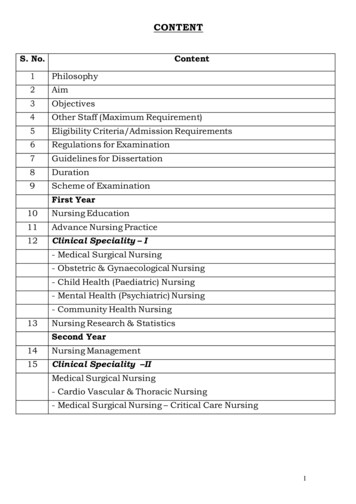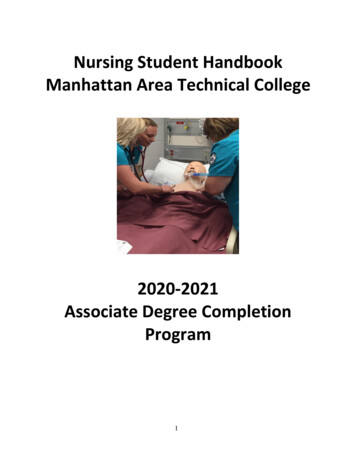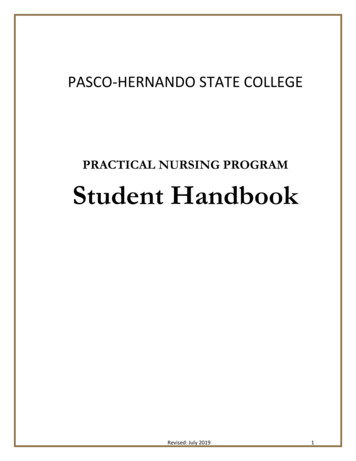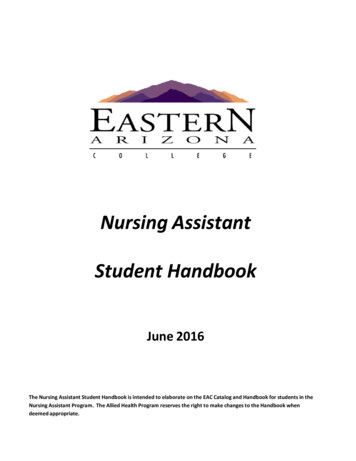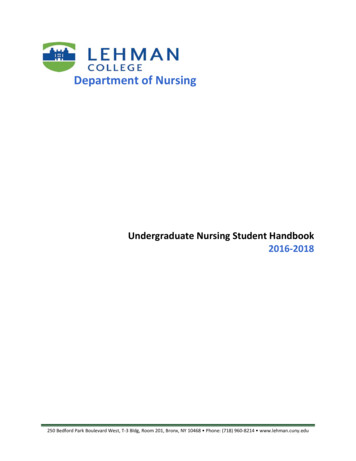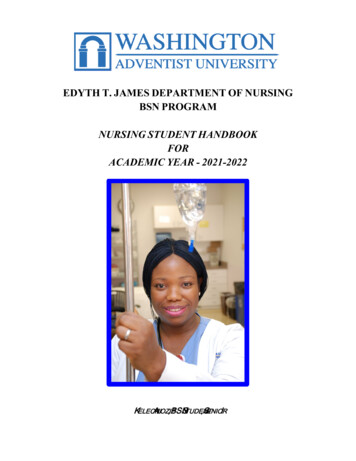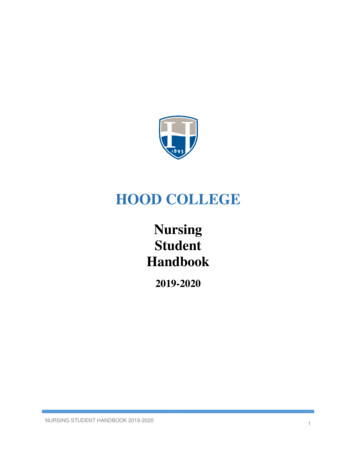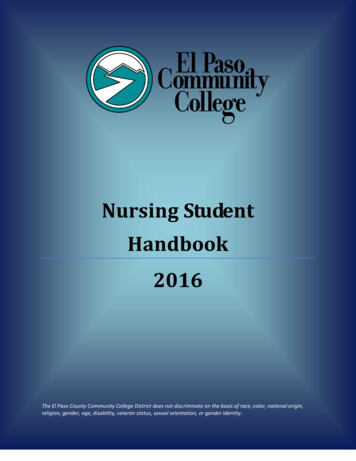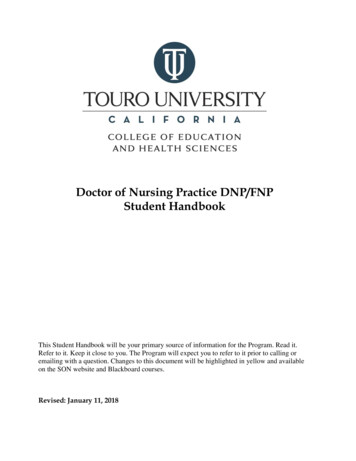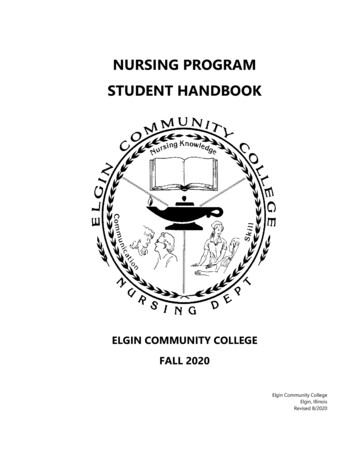
Transcription
NURSING PROGRAMSTUDENT HANDBOOKELGIN COMMUNITY COLLEGEFALL 2020Elgin Community CollegeElgin, IllinoisRevised 8/2020
Welcome to the ECC Nursing Program!ECC’s Nursing Program is approved by the Illinois Department of Professional Regulation forprofessional nursing and is accredited by the Accreditation Commission for Education in Nursing(ACEN). The Accreditation Commission for Education in Nursing may be contacted at 3343 PeachtreeRoad NE, Suite 850 Atlanta, GA 30326 or by phone at 404-975-5000 or by fax at 404-975-5020.The mission of Elgin Community College is to improve people’s lives through learning.Health Professions Division - Mission StatementThe mission of Health Professions is to provide quality education that supports the development ofhealth and wellness practitioners.Health Professions Division - Vision StatementThe Health Professions Division will be recognized as a leader in providing quality education usinginnovative teaching strategies. Our students will develop confidence in their discipline throughtraining in simulated and clinical settings. We will utilize interdisciplinary activities to instill a sense ofprofessionalism in our graduates and nurture an appreciation for lifelong learning.Nursing Program Mission StatementThe mission of the Elgin Community College Associate Degree Nursing Program is to provide anequitable, quality education that supports the development of professional nurses to practice safe,quality, evidence-based nursing care in the current healthcare environment.NURSING PROGRAMSTUDENT HANDBOOKPage 2
Table of ContentsWELCOME TO THE ECC NURSING PROGRAM!.2HEALTH PROFESSIONS DIVISION - MISSION STATEMENT .2HEALTH PROFESSIONS DIVISION - VISION STATEMENT .2NURSING PROGRAM MISSION STATEMENT .2ELGIN COMMUNITY COLLEGE NURSING PHILOSOPHY.6CONCEPTUAL FRAMEWORK .7PROGRAM ORGANIZATION .8LEVELS.8COURSES.8COURSE STUDENT LEARNING OUTCOMES.8NURSING PROGRAM STUDENT LEARNING OUTCOMES WITH COMPETENCIES .8NURSING CURRICULUM PLAN.10POLICIES AND PROCEDURES.11ACADEMIC INTEGRITY POLICIES. 11Administrative Procedure 4.407. 11Nursing Professional Dishonesty Policy. 15Health Professions Contract of Social Media Conduct . 16Contract of Handheld Technology . 16Classroom .16Clinical/Lab/Simulation.17BEHAVIOR POLICIES: ADMINISTRATIVE PROCEDURE 4.402 . 17CRIMINAL BACKGROUND CHECKS AND DRUG TESTING . 22TESTING AND GRADING POLICIES. 23CLINICAL EVALUATION POLICIES. 24Definitions of Clinical Behaviors/Explanations . 24STUDENT RETENTION AND PROMOTION . 25Failure/Withdrawal & Re-entry Policy . 26Course Repeat Steps:. 26Advanced Placement Students . 26Health Professions Dismissal Policy . 26Due Process / Student Appeal . 27Student Complaint Procedure. 27CLASSROOM/CLINICAL EXPERIENCE . 27Classroom . 27Criteria for Written/Online Assignments . 28Clinical . 28Clinical Experience Attendance and Preparation .28Patient Data in the Clinical Area.29NURSING PROGRAMSTUDENT HANDBOOKPage 3
Health Professions Discrimination Statement.29Nursing Program Dress Code.29Health Requirements .31Criminal Background Checks and Drug Testing. 32American Heart Association Basic Life Support CPR Healthcare Provider Certification . 32Liability Insurance .33Clinical Experiences at Place of Employment .33Transportation to Affiliating Agencies .33Snow Day Policy . 33Emergency Alert System. 33SIMULATION EXPERIENCE. 34BLOODBORNE PATHOGEN EXPOSURE POLICY . 34Procedure:. 35Personal Protective Equipment. 36Post-Exposure Practices. 37Reporting of Clinical Exposure Incidents. 37PROBATION . 38EXAMS, GRADUATION, LICENSURE .38STANDARDIZED TESTING. 38DEGREE AUDIT. 39GRADUATION REQUIREMENTS. 39NCLEX EXAMINATION . 39NURSING LICENSURE. 39CNA CERTIFICATION . 40NURSING LABS .41COMPUTER LABS . 41NURSING SKILLS LABS. 41Student Nurse Pack Purchasing Procedures . 41Skill Validations. 41Scheduling Lab Faculty Appointments .42Appointment Cancellations, No Show and Tardiness .43Success with Validations.43Failure with Validations.43Dress Code for Validations .44Student Lab Responsibilities: . 44RESOURCES.45LOCKERS . 45COPY MACHINE . 45MULTI-MEDIA MATERIALS . 45REFERENCE MATERIALS . 45SPARTAN EARLY ALERT REFERRAL. 45NURSING PROGRAMSTUDENT HANDBOOKPage 4
STUDENT COMMUNICATION.46STUDENTS WITH DISABILITIES . 46ECC STUDENT EMAIL. 46REVISIONS IN NURSING PROGRAM STUDENT HANDBOOK . 46HEALTH PROFESSIONS DIVISION STATEMENT ON SAFETY .47CLINICAL AGENCIES .48HEALTH PROFESSIONS ADMINISTRATION/STAFF/FACULTY .49APPENDIX LISTING.50NURSING COURSE FAILURE/WITHDRAWAL CONTRACT . 51NOTICE OF PROBATION . 53EXPOSURE / INCIDENT REPORT FORM . 55NURSING PROGRAM STUDENT HANDBOOK AGREEMENT . 56HEALTH PROFESSIONS: NURSING PROGRAM . 57VOLUNTARY ASSUMPTION OF RISK & RELEASE OF LIABILITY . 58CONFIDENTIALITY/AV/PHOTOGRAPHY AGREEMENT. 59NURSING LAB SIMULATION CENTER CONSENT FORM. 60NURSING PROGRAMSTUDENT HANDBOOKPage 5
Elgin Community College Nursing PhilosophyThe Elgin Community College Nursing Program is a leader in our community in preparing studentsfor contemporary nursing practice. A concept-based design is utilized to prepare the graduate topractice in a multifaceted, evolving health care environment. Based on changing community andglobal needs, there is a deliberate focus in the curriculum on wellness, health promotion, and thecomplex care needs of the older adult. Because nursing is an art and a science, students learn toprovide safe, quality, evidence-based, holistic, and person-centered care to diverse populations withthe goal of improving person-centered outcomes.Faculty, students, and the community establish a partnership wherein the faculty provides diverselearning opportunities and the students are challenged to accept responsibility for active learning.Life-long learning is essential to maintain competence and accountability.Shared ValuesFurthermore, the Nursing Program reflects the Shared Values of Elgin Community College:Excellence. All college functions and services must strive for the highest level of excellence tosuccessfully achieve our mission. Learning activities must be of the highest quality to help studentsachieve their goals.Freedom of Inquiry. We believe a learning community is most engaging and viable when a spirit offree inquiry exists, allowing everyone the freedom to explore new and diverse ideas and to expresstheir interests and attitudes.Equity. We believe that everyone must have an equal opportunity to grow through learning, and wepledge to provide all who take part in our learning activities with the opportunities and supportsneeded for success.Ethical Practices. As we strive to develop our learning community, we will maintain at all times thehighest level of honesty, communication, cooperation and credibility in all relationships.Accountability. As a public institution, we believe we must assume responsibility for all our decisionsand actions, and we must also be open and honest in all our affairs and always ensure that we aremaking the best use of our resources.Respect for Diversity. All constituencies are important to achieving our vision. Therefore, we mustrespect the unique and diverse perspectives each person offers and embrace those differences as themeans for developing the strongest learning community possible. We promote individual growthand a positive sense of self-worth for all members of the college community.Community Engagement. As an active and involved part of our community, we must play an integralrole in developing, advancing, and serving the local community.NURSING PROGRAMSTUDENT HANDBOOKPage 6
Conceptual FrameworkConcepts provide the foundation and structure of the Elgin Community College Nursing Programcurriculum. The concepts are grouped into three major categories: the person, wellness/health andillness, and professional nursing. Selected concepts are supported by evidence-based practice andare integrated throughout the curriculum. Each concept has associated exemplars through whichholistic, person-centered nursing care is learned.The Elgin Community College Nursing Program Student Learning Outcomes and competenciesincorporate the Institute of Medicine (IOM) and Quality and Safety Education for Nurses (QSEN)competencies, the National League of Nursing (NLN) core values, and professional practicestandards. Courses within the curriculum are structured and leveled to facilitate students’achievement of the Program Student Learning Outcomes and related competencies.The curriculum addresses nursing care across the lifespan while considering the uniqueness ofpersons, families and communities in the achievement of optimal health and wellness. Thiscurriculum reflects the multifaceted, nonlinear nature of nursing needed in the twenty-first century.NURSING PROGRAMSTUDENT HANDBOOKPage 7
Program OrganizationLevelsThe Program is divided into four levels:Level 1 is comprised of the first semesterLevel 2 is comprised of the second semesterLevel 3 is comprised of the third semesterLevel 4 is comprised of the fourth semesterCoursesA course is the subdivision of a level, carrying a course number and name, for example:Nursing 142 Concepts of Nursing Practice I.Course Student Learning OutcomesEach course has student learning outcomes identified in the course syllabus. These outcomes are thefocus of classroom discussion, academic testing, and lab and clinical expectations.Nursing Program Student Learning Outcomes withCompetenciesThe Nursing Program includes four semesters of nursing courses in addition to the general educationcourses required for the Associate of Applied Science Degree in Nursing.1. Engage in clinical judgment to provide safe evidence-based, person-centered nursing careacross the lifespana. Apply clinical judgment to provide safe, evidence-based care to persons with complexand chronic needs.b. Manage potential complications based on anticipated risk and changes in healthconditions.c. Prioritize person-centered nursing care for individuals and groups efficiently in anevolving health care environment.d. Create, implement and evaluate holistic person-centered teaching strategies toachieve optimal health outcomes.e. Provide continuity of care to ensure safe, uninterrupted nursing care.f. Perform Level 4 psychomotor skills safely and competently for efficient, effective, andcompassionate person-centered care.2. Integrate the knowledge, skills, and attitudes that create cultures of quality, safety andexcellence to improve person-centered outcomesa. Model the knowledge, skills, and attitudes that create cultures of safety, quality, andexcellence to improve person-centered outcomes.NURSING PROGRAMSTUDENT HANDBOOKPage 8
b. Evaluate the impact of performance improvement measures on person-centered careand resource utilization.c. Evaluate the clinical microsystem and its impact on the nurse’s ability to provide safe,quality care.3. Collaborate with the person, the person’s support system, and members of the healthcareteam to achieve best health outcomesa. Demonstrate communication competence with members of the healthcare team, theperson and their support system to deliver person-centered care.b. Evaluate effectiveness of communication strategies with members of the health careteam including the person and support system.c. Evaluate standards used that govern behavior among peers and colleagues to create aclassroom and clinical environment that promotes cooperation, respect and trust.4. Incorporate information and technology to communicate, manage knowledge, prevent error,and support clinical decision-makinga. Utilize patient care and health information technologies to enhance safe nursing careand prevent error.b. Evaluate data collected from health information resources to support clinical decisionmaking.c. Document all aspects of nursing care provided in an accurate and timely manner.5. Assimilate leadership, management of care, ethical and legal principles in professionalnursing practicea. Display awareness of own strengths, limitations, and professional identity as a teamleader and member.b. Apply delegation principles related to professional nursing practice when caring for agroup of persons.c. Demonstrate accountability by adhering to the ethical, legal, and regulatory standardswithin the Level 4 scope of nursing practice.d. Create a professional development plan that demonstrates a commitment tocontinuous, lifelong learning.6. Promote a culture of caring to provide holistic, compassionate, and culturally competent carea. Demonstrate cultural competence in therapeutic relationships with persons across thelifespan.b. Contribute to the promotion of a culture of caring in the health care environment.c. Advocate for persons and support systems to promote self-determination, integrity,and on-going growth as human beings.NURSING PROGRAMSTUDENT HANDBOOKPage 9
Nursing Curriculum PlanAssociate of Applied Science in NursingEntrance RequirementsBIO 110BIO 245PSY 100PSY 218Total4.04.03.03.014.0 credit hoursFirst SemesterBIO 246BIO 265HPE 101NUR 142NUR 144Total4.04.01.08.51.519.0 credit hoursSecond SemesterNUR 152ENG 101Total9.53.012.5 credit hoursThird SemesterNUR 242ENG 102Total9.53.012.5 credit hoursFourth SemesterNUR 252Liberal Studies 3.09.0(Recommended: HUM 216- Ethics)Total12 credit hoursProgram Total: 70 credit hoursNURSING PROGRAMSTUDENT HANDBOOKPage 10
Policies and ProceduresAll students must read and follow the updated Nursing Program Student Handbook each semesterand as necessary. All students will be responsible for following any policy and procedure changesmade and will sign the Health Professions Nursing Program Student Handbook Agreement page. Allstudents must follow the ECC policies in the College Catalog.Academic Integrity PoliciesAdministrative Procedure 4.407References Board of Trustees Policy: G 1Subject: Academic IntegrityAdopted: September 5, 2007Amended:August 9, 2011; September 25, 2014; April 9, 2015; May 4, 2017; June 4, 2018Review: This procedure will be reviewed by the Vice President for Teaching, Learning and StudentDevelopment by June 30 of every odd-numbered year.I. Statement on Academic IntegrityElgin Community College is committed to providing a learning environment that values truth,honesty, and justice. Academic integrity means being honest and responsible regarding any worksubmitted as one’s own while in a college course. Failing to do so is considered academicdishonesty. Acts of academic dishonesty include cheating, plagiarism, fabrication, complicity,submitting same work in multiple courses, and/or misconduct in research. [In Health Professionsthis includes the professional code of ethics for each discipline.] The purpose of academicassignments is to help students learn. The grade received shows students’ own understanding andeffort. It also indicates how well they have met the learning goals in a course. In order todemonstrate that learning, the work done must always be their own and if students consult others’work, this must be properly cited. Students who commit any act of academic dishonesty will besubject to sanctions imposed by their instructor, up to and including failure in the course. See theECC website for more information on ECC’s Academic Integrity policy.For information on how to avoid academic integrity violations, see the Plagiarism Modules availablefrom the main menu on your D2L homepage (under the Student Support tab) or visit the ECC LibraryTutorials Research Guide. Students may also seek assistance from Librarians as well as the WritePlace staff.II. Acts of Academic Dishonesty include, but are not limited to the following:A. CheatingAt its most basic level, cheating is the unauthorized use of outside assistance.Cheating includes use of notes, study aids, or other devices that are expresslyforbidden by the instructor for the completion of an assignment or an examination. Inaddition, cheating occurs when a student copies another individual's work or ideas.NURSING PROGRAMSTUDENT HANDBOOKPage 11
B. PlagiarismPlagiarism is the presentation of another person’s written words or ideas as one’sown. Students are guilty of plagiarism if they submit as their own work: the sequence of ideas, arrangement of material, pattern of thought of someoneelse, even though it is expressed in the student’s own words; plagiarism occurswhen such a sequence of ideas is transferred from a source to their work withoutthe processes of digestion, integration, and reorganization in the writer’s mind,and without acknowledgement in their work. part or all of a written assignment copied or paraphrased from another person’swork without proper documentation; paraphrasing ideas without giving credit tothe original author is also plagiarism. reusing or modifying a previously submitted work for a present assignmentwithout obtaining prior permission from the instructors involved.C. FabricationFabrication is the invention or counterfeiting of data and/or research. [In HealthProfessions this includes patient data.]D. ComplicityComplicity occurs when a student provides assistance in any act that violates theintegrity policy. Students are guilty of being accomplices to academic dishonesty if they:[In Health Professions talking during an exam/quiz is considered sharinginformation, and failure to report knowledge of other students cheating is alsoconsidered an act of complicity.] allow their work to be copied and submitted as the work of another prepare work for another student and allow it to be submitted as that student’s ownwork keep or contribute materials with the clear intent that they will be copied or submittedas work of anyone other than the author purchase work from another source fail to report acts of plagiarism to their instructor; students who know their work isbeing copied are presumed to consent to its being copiedE. Multiple SubmissionsMultiple submission occurs when a student submits the same (or largely unaltered) workin multiple courses without instructor approval. Multiple submission does not includecoursework in linked courses (in which instructors develop assignments together), norshall it cover those situations in which a student has received approval to expand ordevelop previous work.F. Misconduct in ResearchMisconduct in research occurs when a student violates professional guidelines orstandards in research, including college standards and the Student Code of Conduct.NURSING PROGRAMSTUDENT HANDBOOKPage 12
III.Instructor Initiated SanctionsIf an instructor identifies an act of academic dishonesty, the instructor shall determine theappropriate sanction(s) for the particular offense. If the instructor chooses one of the sanctions listedbelow, they must document the violation using the Academic Integrity Violation form. The form mustbe sent to the student via the ECC student email account, the Academic Dean, and the Dean ofStudent Services and Development. This enables the Dean of Students to monitor multiple offenses.[In Health Professions these sanctions may include dismissal from the program depending onthe severity of the offense. Refer to the Student Code of Conduct which lists behavior forwhich a student may be subject to disciplinary sanctions by the College.] Completion of “Writing with Integrity” course through the Write PlaceReduced grade on assignmentFailing the assignmentReduced final course gradeFailing grade for courseInstructors have the discretion to use the offense as a “teachable moment,” which may include averbal warning or re-doing an assignment when responding to issues related to missed or partialcitations, incorrect formatting, etc. In these instances, the instructor does not need to submit theAcademic Integrity Violation form.Students are informed of their right to appeal the violation through the information contained in theAcademic Integrity Violation form. The student must appeal within ten (10) days of receiving theviolation form from their instructor. While an appeal is in progress, the student must be allowed tocontinue actively participating in the class as long as the student is in compliance with the College’sStudent Code of Conduct Administrative Proced
The curriculum addresses nursing care across the lifespan while considering the uniqueness of persons, families and communities in the achievement of optimal health and wellness. This curriculum reflects the multifaceted, nonlinear nature of nursing needed in the twenty-first century. NURSING


